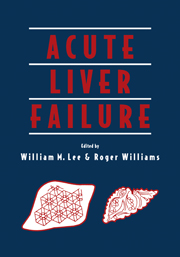Book contents
- Frontmatter
- Contents
- Preface
- Foreword
- Acknowledgments
- Contributors
- Part One Clinical Syndrome and Etiology
- Part Two Mechanisms of Disease and Multisystem Involvement
- 7 Role of cytokines and immune mechanisms in acute liver failure
- 8 Pathology of acute liver failure
- 9 Hepatocyte replication and liver regeneration
- Part Three Intensive Care Management
- Part Four Transplantation
- Part Five Artificial and Bioartificial Liver Devices
- Part Six Other Applications
- Index
- Plate section
7 - Role of cytokines and immune mechanisms in acute liver failure
from Part Two - Mechanisms of Disease and Multisystem Involvement
Published online by Cambridge University Press: 20 May 2010
- Frontmatter
- Contents
- Preface
- Foreword
- Acknowledgments
- Contributors
- Part One Clinical Syndrome and Etiology
- Part Two Mechanisms of Disease and Multisystem Involvement
- 7 Role of cytokines and immune mechanisms in acute liver failure
- 8 Pathology of acute liver failure
- 9 Hepatocyte replication and liver regeneration
- Part Three Intensive Care Management
- Part Four Transplantation
- Part Five Artificial and Bioartificial Liver Devices
- Part Six Other Applications
- Index
- Plate section
Summary
INTRODUCTION
Acute liver failure (ALF) is a syndrome which results from a large number of inciting agents including viruses and toxins, whose common endpoint is massive hepatic necrosis (Lee 1993). Although the inciting agent may directly damage hepatocytes, recent evidence has suggested that inflammatory cells and their products contribute to the hepatic necrosis (Andus et al. 1991; Winwood and Arthur 1993; Izumi et al. 1994; Rosser and Gores 1995). Furthermore, in patients with liver failure, endotoxemia occurs which contributes to the pathogenesis of this disorder (Verhoef and Mattsson 1995). Recent interest has focused on the intermediate pathways activated during the initial injury that lead to progressive and rapid hepatocyte destruction. A number of studies have implicated the resident cell population of the liver, especially Kupffer and endothelial cells, in combination with elements of the immune system as key participants in the destructive process which ultimately leads to liver failure (Winwood and Arthur 1993). Kupffer cells have been implicated in liver necrosis during hepatotoxicity, endotoxemia, and viral-induced liver disease. Several studies have suggested this destructive role by showing amelioration of injury with inhibition of Kupffer cell function and potentiation of injury by activating these cells. Of particular interest is the rapidly increasing body of evidence identifying biological modifiers such as cytokines which are thought to play a major role in the pathogenesis of liver injury. Cytokines have numerous effects including increasing the expression of adhesion molecules, production of nitric oxide and activation of the immune coagulation system all of which have been implicated in the pathogenesis of liver injury (Halloran et al. 1993; O'Garra and Murphy 1994; Essani et al. 1995).
- Type
- Chapter
- Information
- Acute Liver Failure , pp. 67 - 78Publisher: Cambridge University PressPrint publication year: 1996
- 1
- Cited by



